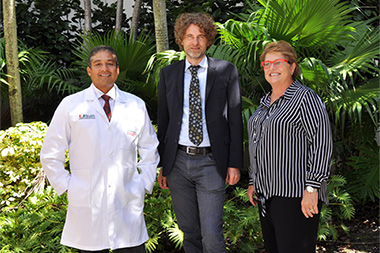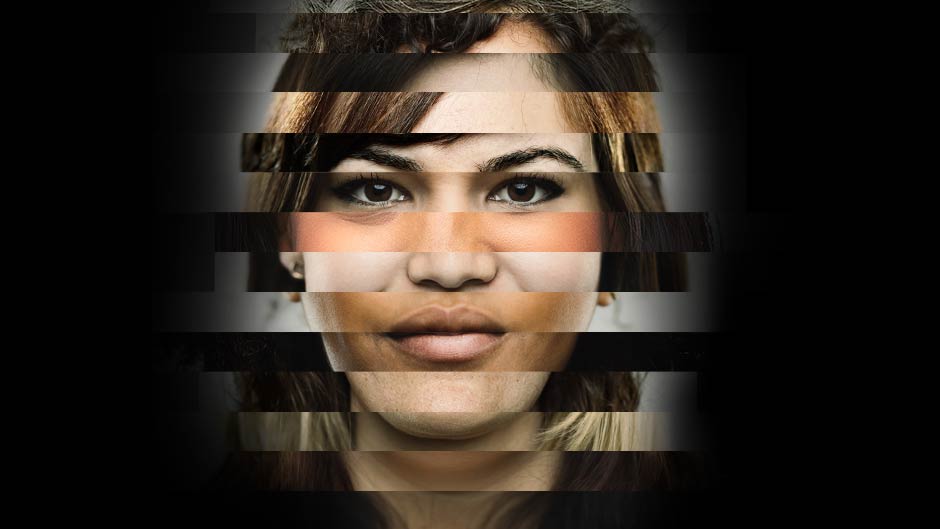Imagine the day your doctor can prescribe the most effective medication for your high blood pressure based on your genes, your lifestyle, and your environment.
This is not some far-fetched fantasy. As the Miller School of Medicine gears up for its integral role in the largest and most inclusive study ever undertaken by the National Institutes of Health, the promise of such precision medicine is literally at the University of Miami’s doorstep—and all of us have the opportunity to take part by confidentially sharing our biological and health data.
Thanks to UM’s expertise in genetics and genomics and its location in one of the most ethnically diverse counties in the nation, the University is the lead partner in the SouthEast Enrollment Center (SEEC), which was just awarded $60 million to enroll about 100,000 of the more than 1 million people that the NIH’s ambitious $1.5 billion All of Us Research Program aims to recruit across the U.S. over the next five years. In addition to UM, the University of Florida and Georgia’s Emory University and Morehouse College of Medicine are partners in the SEEC, which is now inviting Floridians and Georgians to contribute to the largest and richest health data resource of its kind.
 |
| From left are UM’s principal All of Us investigators Olveen Carrasquillo, M.D., M.P.H., Stephan Züchner, M.D., Ph.D., and Margaret A. Pericak-Vance, Ph.D. |
“There has never been an effort like this before,” said Dr. Stephan Züchner, the SEEC’s lead principal investigator (PI) who chairs UM’s Dr. John T. Macdonald Foundation Department of Human Genetics and co-directs the John P. Hussman Institute for Human Genomics. “Right now, medicine is practiced in very broad strokes. Most people with high blood pressure get exactly the same drug, based solely on their blood pressure. This study will begin to collect the data that will enable us to begin fine-tuning the therapies for specific health issues and specific populations.”
That cannot happen, however, without an immense increase in the breadth and scope of genomic and other data that biomedical researchers can analyze, especially from minority populations who suffer disproportionately from a number of health conditions but historically have been left out of biomedical research.
Although blacks, Hispanics and other minorities now comprise nearly 40 percent of the U.S. population, non-Hispanic whites still make up 90 percent of the participants in large-scale clinical trials that could lead, for example, to more effective treatments for high blood pressure.
“The current tools of precision medicine have immense potential to reduce health disparities by improving how we prevent and diagnose disease for all individuals. But we lack the statistical power to make the fine-grained predictions about how a given treatment will affect a given individual,” said UM’s second SEEC PI, Dr. Margaret Pericak-Vance, a global leader in the genetics of common diseases, who is the Dr. John T. Macdonald Foundation Professor of Human Genetics, director of the Hussman Institute and executive vice chair of the Department of Human Genetics. “Achieving this goal depends on the participation of diverse populations because genetic variations and risk/protective effects in one population may not be present in other populations.”
Which is where the U and you come in. Over the next five years, UM’s All of Us team—which includes three PIs, three co-investigators and eight research managers, coordinators and assistants—hopes to draw many of the 40,000 participants they expect to enroll across South Florida from UM faculty, staff, students, and patients. Although the emphasis is on recruiting members of South Florida’s diverse black and Hispanic communities, anyone who is over 18 and able to give their informed consent is eligible and encouraged to participate. Nine other academic consortia across the nation also are enrolling participants that reflect the geographic, ethnic, racial, socioeconomic, age, and gender diversity of the U.S.
“The idea is to widen who gets to participate in and benefit from biomedical research, which is an ethical imperative,” said Rosario Isasi, a research assistant professor at the Department of Human Genetics and a co-investigator leading the ethical and regulatory aspects of the SEEC. “It’s an opportunity to give communities that have not previously been represented an important seat at the table.”
Those interested in signing up can create an account at joinallofus.org and fill out the necessary enrollment and consent forms. The online process, which takes about 30 minutes, includes watching info videos, answering several health surveys, and, for those who agree, sharing electronic medical records. Participants will be invited later to a University of Miami site to provide their physical measurements, including height, weight, and blood pressure, and samples of their blood and urine.
The data, which will be encrypted and subject to robust privacy safeguards, will be used to build the national All of Us database that researchers can access to figure out why people respond differently to specific treatments, develop new screening and treatment approaches, and provide more precise, personal, and effective healthcare.
“Once they hear about the study and understand the goals, many people are very supportive and want to be part of it,” said Dr. Olveen Carrasquillo, professor of public health sciences, chief of the Miller School’s Division of General Internal Medicine and the third UM PI who serves as the SEEC’s participant engagement lead. “We think a large component of the major medical discoveries over the next 50 years are going to come from this cohort so being a part of the 1 million is sort of like a gift you can give to your kids and your grandkids.”
It’s also a gift that could keep on giving. As Carrasquillo notes, All of Us committees are deciding which results and genetic information will be shared with participants who elect to receive such information. For example, he said, if a participant’s genetic profile includes a mutation linked to breast or ovarian cancer, they could be notified.
But even more exciting to Carrasquillo is all the information about lifestyle, environment, and other non-genetic factors that the research program is collecting. As a national expert in health disparities who has treated many poor, black and Hispanic patients—those left out of previous clinical studies—he knows too well that social factors like income, education, and housing can determine health even more than genes.
“For the first time, we’re going to have a huge sample size to start examining how environmental, lifestyle and other social factors interact with the health of populations that traditionally have been underrepresented in medical research,” Carrasquillo said. “That’s what excites me—that it’s not just about genes; it’s about a lot of other things that are important for health.”
The School of Nursing and Health Studies is also playing a role in the All of Us program. With a mini-grant awarded by the American Association of Colleges of Nursing, SONHS recently joined community partners in hosting a health fair in Homestead to raise awareness about the program among the rural area’s predominantly Hispanic population and the benefits of participating in it.
“This effort is important because these rural communities have been historically underrepresented in biomedical research, yet they experience a higher-than-average incidence of chronic disease like hypertension, diabetes, and arthritis,” said Associate Professor Rosina Cianelli, who was awarded the grant with Associate Professor of Clinical Natalia Villegas.
From his geneticist’s perspective, Züchner, the lead PI who has discovered a large number of disease genes, can’t even begin to imagine the benefits that the All of Us treasure trove will bring to all of us.
“It will tell us more than ever before which differences on the genomic level matter and how these differences are touching everything that makes us human, from sleep, diet, exercise, and well-being.”

